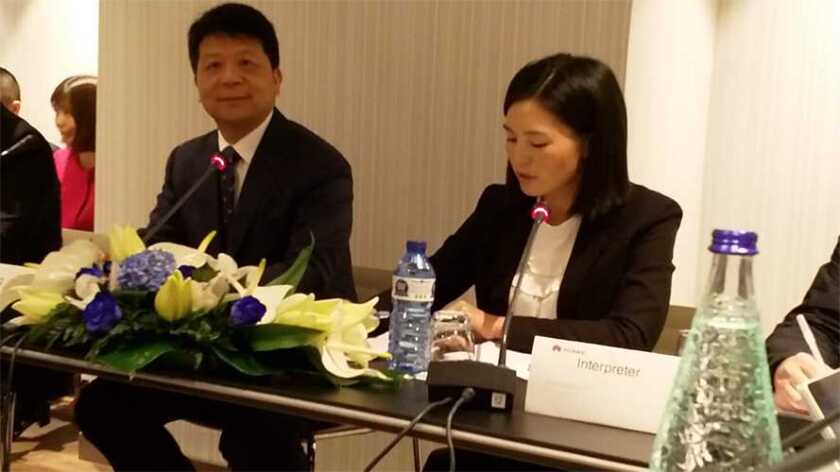Guo Ping, the current rotating chairman of the Chinese equipment vendor, called at Mobile World Congress (MWC) in Barcelona for the industry “to shoulder the responsibility and work together”. There should be “clear and unified regulations”.
Guo (pictured, with interpreter), one of three senior executives who take in it turns to chair Huawei for six months at a time, said “the industry and governments need to develop verifiable standards”. Security “should not be something decided by politicians”.
This was his response to suggestions – from the US and a number of other countries – that Huawei provides back doors in its software so that China can spy on traffic going through networks that use its equipment.
“We have never allowed and will not allow back doors in our equipment,” he said in answer to a question from Capacity. “We will not allow anyone to do that.”
Capacity asked Guo to name the companies – other vendors as well as telcos – that are working with Huawei on his suggested industry programme, but he did not name any.
He said that telcos – mentioning AT&T and Verizon, two companies banned by the US from using Chinese kit – “need to manage their networks”. He said work by the GSMA, the mobile industry’s trade association that is organising MWC this week, should expand work it has already started in Europe “and promote it to the whole world”. Cyber security should be done by the industry “rather than by politicians”.
The industry “needs to have joint responsibility” for security. “In Huawei our responsibility is to design and produce to certain unified standards.” These are set by organisations such as 3GPP for 5G networks. “Huawei fully follows the standards and our competitors fully follow the standards.” But he called for more emphasis on security in the standards.
Guo added: “I believe our customers will make rational decisions based on the facts and an assessment of risks.”
Later on Sunday Olaf Swantee, CEO of Swiss operator Sunrise, defended Huawei and said his plan to run 5G services in Switzerland met the country’s security standards.
“In Switzerland we have very strict security regulations. We do frequent audits and the authorities make sure we are looking at these topics all the time,” said Swantee.
“I’m not a politician, I’m a CEO of a telco. My priority is to make sure the customers on my network are secure.”
He said he is “talking to colleagues in the industry about sharing best practices. The first responses have been positive. There are discussions.”
In Switzerland “there are a lot of rules [on security]. Telecoms operators are under a lot of scrutiny.
Sunrise is in the process of launching fixed wireless access using early 5G services using 100MHz of spectrum on the 3.5GHz band, he said. “By the end of March 150 cities and towns will be covered.”
However supply of customer premises equipment is still limited so Sunrise will be testing services with a limited number of users. “There will be 100 5G pioneers we will select and test. As production ramps up we will drive the volume up.”
Guo said earlier that Huawei has spent $2 billion on 5G development. “We are ahead of other competitors by 12 months,” he claimed. “Over the past few months we have faced security challenges from several countries and by one major power. As a key member of the GSMA we provide secure network services and personal privacy.”
He adopted the standard Huawei line that it does not need the US and will not be affected if the US extends its ban on Chinese equipment: currently major network operators are restricted but small, rural phone and cable companies are allowed to use its systems.
“The US is just part of the world. It is not the whole of the world. The whole world’s ICT needs are very strong.” If the US does not use Huawei kit, “our future will not be decided by that. We will continue to have close cooperation with customers who have chosen us. … The US market can be ignored by us.”
There is a threat that President Donald Trump will impose an executive order banning Chinese equipment, but that “would be unfair” to small telecoms providers in the US. “I sincerely hope that that customers of Huawei in the US can grow and use our services.”






